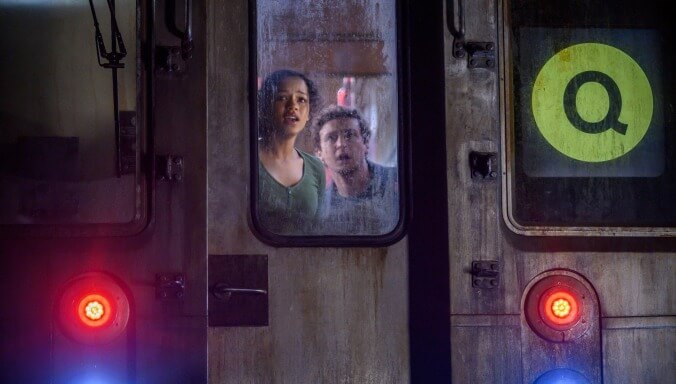Tournament Of Champions fails to take Escape Room to the next level
The characters are empathetic, the set design is neat, and the movie doesn't amount to much

Here’s something that feels real about the Escape Room movies, which are otherwise exercises in elaborate, high-tech, low-gore horror absurdity: Zoey (Taylor Russell) seems like a genuine young person. Russell is the usual twentysomething playing a character young enough to represent a significant portion of the PG-13 movie’s target demographic. But she’s uncommonly convincing in that nebulous zone between teenage moxie and adult responsibility. Late in Escape Room: Tournament Of Champions, she takes a defiant stand against her second-time captors, and it feels both satisfying and genuinely foolish.
That’s the kind of energy necessary to proceed through this sequel’s gauntlet of traps. Zoey and fellow survivor Ben (Logan Miller) have arrived in New York City with the coordinates Zoey discovered at the end of the first Escape Room, hoping to expose the corporation that has been abducting people and sending them through deadly interactive puzzles for the base purposes of gambling and entertainment. (Their surroundings are less befouled than the typical Jigsaw lair, but they also fail to offer any valuable life lessons.) It’s not long before they’re unwittingly guided into a subway car which, as tourists, they fail to recognize as suspiciously sparse in population. When the car separates from the rest of the train and heads into a side tunnel, Zoey and Ben realize that they’re riding with passengers that have also survived rooms: Brianna (Indya Moore), Rachel (Holland Roden), Nathan (Thomas Cocquerel), and Theo (Carlito Olivero), all experienced and none too pleased to be drawn back into the game.
Though this isn’t quite Escape Room Takes Manhattan, the first challenge—that subway car becomes an electrified, token-operated prison—is an amusingly elaborate take on the formula, forcing the champions to combine a game of Hangman, basic electrical engineering, and proofreading. Several more set pieces follow, always with impressive set design but not necessarily with escalating intensity. The peak, in that regard, is probably the second sequence, which features murderous lasers out of Escape Room’s Screen Gems cousin Resident Evil. (How this newer series escaped from Sony with the Columbia Pictures logo is a puzzle not even the most experienced escapees can solve.)
As the heroes make their way through (or don’t), the movie shows almost too much faith in its own premise. Tournament Of Champions opens with a previously-on reel, followed by a number of flashbacks woven into its first proper scene—not the most promising start to a feature film, but also a respectful recognition that even fans of the first movie might be wandering into this one in a late-pandemic daze, recalling the predecessor with less-than-perfect clarity. After 30 or 40 minutes, it becomes clear that, despite a few more callbacks, this is a more-of-the-same sequel, not a next-level sequel. At its best, the new deathtrap scenarios have a dreamlike quality, like the beach scene that suddenly tints into postcard fakeness with the flash of a camera. At their worst, they turn videogamey, forcing the audience to watch characters play through levels devised by returning director Adam Robitel and an astonishing six credited writers.
Most disappointing: Not much is made of the Tournament Of Champions concept besides the ability to skip over characters’ initial confusion and disbelief—helpful, yes, but more a matter of expediency than creativity. It’s too bad, because both Escape Rooms share an unusual horror-movie strength: the dignity and empathy afforded the potential victims. The similarly structured Saw movies typically give its characters about 45 seconds before someone snaps and does something screamingly venal; Zoey and pals may be prone to shouting what’s happening to them (“They’re filling the room with water!”), but they aren’t dummied-up stand-ins for the dregs of humanity.
What, then, do these movies stand for? If there’s anything beneath the polished surface, it’s probably rooted in Russell’s performance. Maybe it’s Zoey’s young-adult uncertainty about her place in the world—how her ability to suss out phonies, solve problems, and stick to her principles carries her through these situations without quite allowing her to break free of the system, man. If that’s the thread, it’s a thin one (and only somewhat less bleak than the feculent despair of Saw-land). Less interestingly, it becomes easy to read Tournament Of Champions as a treatise on the seductive fakeness of horror sequels. Sometimes it’s hard to spot the difference between an immersive thriller and a carnival ride that spits you right back out into the line as soon as it’s over.